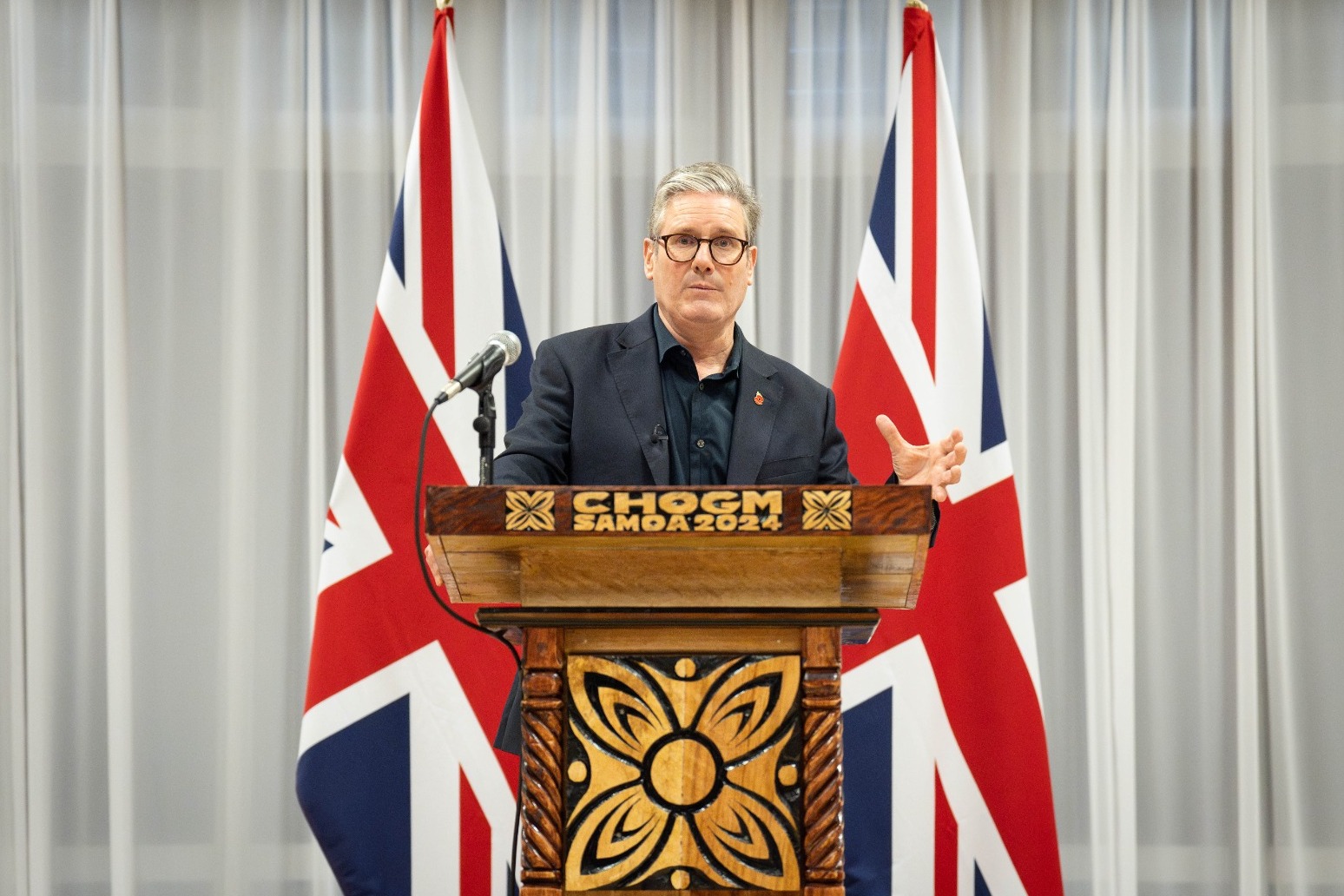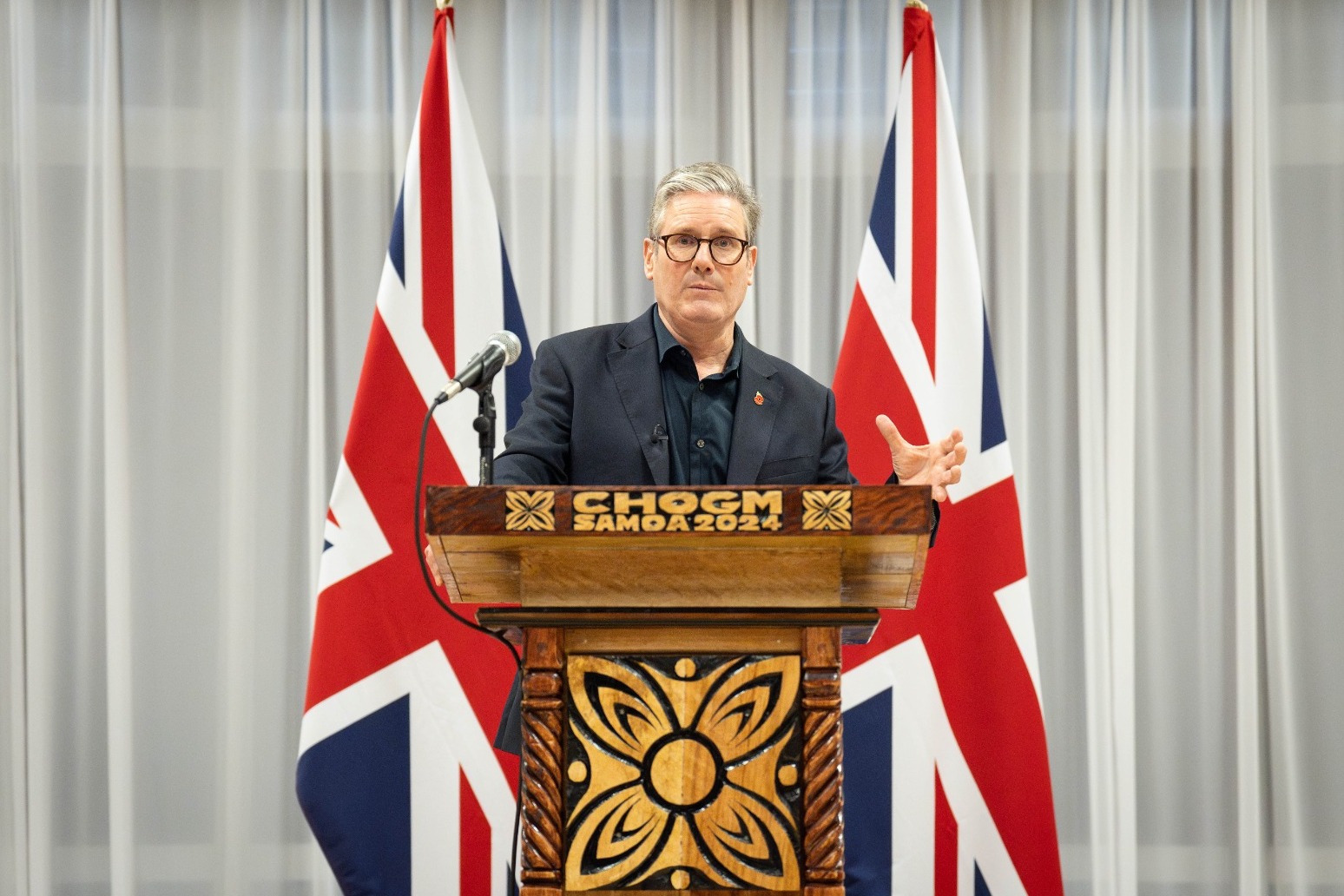Listeners:
Top listeners:
-
 play_arrow
play_arrow
WBPL – LIVE As Blackpool As You Are
 Adele - Easy On Me
Wow I love this song! Thank you for your amazing music!
Aria R.
Adele - Easy On Me
Wow I love this song! Thank you for your amazing music!
Aria R.
 Deep Purple - Smoke On the Water
Shoutout to the rainbow in my life, Gina!
Orion S.
Deep Purple - Smoke On the Water
Shoutout to the rainbow in my life, Gina!
Orion S.
 Luna Park - Space Melody (Radio Version)
Calling my cosmic companion, Jane! Hit play and let's embark on a musical space journey.
Luna Park - Space Melody (Radio Version)
Calling my cosmic companion, Jane! Hit play and let's embark on a musical space journey.
Starmer Budget will embrace harsh light of fiscal reality


The Budget will embrace the “harsh light of fiscal reality” but “better days are ahead”, Sir Keir Starmer will say in a speech ahead of one of the most significant financial statements in recent history.
The Prime Minister will warn of “unprecedented” economic challenges and invite the public to judge him on his ability to rise to them as he sets the tone for Wednesday’s announcement.
He is expected to promise the Budget will “ignore the populist chorus of easy answers” amid a series of expected tax hikes, including an increase to employer national insurance by at least one percentage point.
Referring to the statements announced by New Labour’s Gordon Brown and austerity-era Conservative chancellor George Osborne, Sir Keir will say: “We have to be realistic about where we are as a country. This is not 1997, when the economy was decent but public services were on their knees.
“And it’s not 2010, where public services were strong, but the public finances were weak. These are unprecedented circumstances.
“And that’s before we even get to the long-term challenges ignored for 14 years: an economy riddled with weakness on productivity and investment, a state that needs urgent modernisation to face down the challenge of a volatile world.”
The Prime Minister is expected to say he will not offer the UK’s problems as “an excuse”, adding: “I won’t offer it as an excuse. I expect to be judged on my ability to deal with this.
“Politics is always a choice. It’s time to choose a clear path, and embrace the harsh light of fiscal reality so we can come together behind a credible, long-term plan.”
It comes amid opposition accusations of hypocrisy over an expected decision to extend a freeze on income tax thresholds introduced under the Tories, and confusion over the Labour Government’s use of the term of “working people”.
The party had promised in its manifesto that it would not increase taxes on working people – explicitly ruling out a rise in VAT, national insurance and income tax.
But ministers have since come under pressure to spell out who falls within this term after Sir Keir suggested those who make money from assets such as property would not fall within the definition.
Education Secretary Bridget Phillipson sought to offer reassurances that working people would not see higher taxes “on their payslip” as she faced broadcasters on Sunday morning.
But she was challenged on this assertion in light of reports that Chancellor Rachel Reeves will keep the freeze on income tax thresholds, which sees people pulled into paying higher rates through a phenomenon known as “fiscal drag”.
Asked why the Labour Government was “picking the pockets of working people” – language the Chancellor used to describe the policy when it was reannounced by the Conservatives last year – Ms Phillipson told Times Radio: “I’m just not prepared to speculate on hypotheticals.”
Other measures expected in Wednesday’s statement include a cut to the earnings threshold at which employers pay their national insurance contributions.
Combined with a hike in the rate of employer contributions, this is expected to raise around £20 billion as Ms Reeves seeks to revive public services and put the economy on a firmer footing.
Some £1.4 billion has been announced already to rebuild crumbling schools, as well as a tripling of investment in free breakfast clubs, £1.8 billion for the expansion of Government-funded childcare, and £44 million to support kinship and foster carers.
Ministers have vowed there will be no return to austerity, but Ms Reeves is understood to have called on Government departments to make efficiency savings of 2% in order to free up “billions” of pounds that would be reinvested in the front line.
The Chancellor will also announce a change to the UK’s debt rule that will open the door for the Government to spend billions more on long-term infrastructure, such as replacing dilapidated buildings on the public sector estate.
She is expected to target public sector net financial liabilities (PSNFL) as her new measure of debt rather than the current yardstick of underlying public sector net debt.
A shift to PSNFL would give her greater headroom to meet her debt reduction target, because it includes a wider mix of state assets and liabilities – notably including expected student loan repayments to offset some of the liability.
Sources have said the Chancellor is seeking to find £40 billion in tax hikes and spending cuts in order to avoid a return to austerity in next Wednesday’s fiscal statement.
Ms Reeves has admitted she will raise some taxes, pointing to a £22 billion black hole in the public finances which ministers say was left behind by their Tory predecessors, but has not specified which ones.
Capital gains tax, inheritance tax and fuel duty are among some of other levers she could pull to raise revenue.
The Prime Minister will say the Budget will be underpinned by a commitment to “honest, responsible, long-term decisions in the interests of working people” when he speaks on Monday.
“It’s stability that means we can invest, and reform that will maximise that investment,” Sir Keir is expected to say.
“Stability, investment, reform. That’s how we fix the NHS, rebuild Britain and protect working people’s payslips. Delivering on the mandate of change.”
He will challenge critics to offer an alternative to Labour’s plans and explain which public services should be cut instead.
“It’s time we ignored the populist chorus of easy answers… we’re never going back to that,” the Prime Minister will say.
“If people want to criticise the path we choose, that’s their prerogative. But let them then spell out a different direction.
“This this is an economic plan that will change the long-term trajectory on British growth for the better.
“This is what fixing the foundations and delivering change means. Everyone in this country will benefit from this. Everyone can wake up on Thursday and understand that a new future is being built, a better future.”
Published: by Radio NewsHub
Written by: admin
-
Recent Posts
- Kate Forbes Says Independence For Scotland Is An Economic Necessity
- Prince Harry Returning To The UK For Charity Visits With Donation To Children In Need
- Harry Returning To The UK For Charity Visits With Donation To Children In Need
- Insecure Work Holding Back Economy
- Joel Dommett Hails Huge Shows In Running For National Television Awards
Chart
-

1
Jonas Blue, Liam Payne And Lennon Stella
Polaroid
-

2
Tanja Thomas
One Way Ticket (To The Blues)
-
3
The Monkees, 01.01
I'm A Believer
-
Top popular

Difficult day as last blast furnace shuts down at Port Talbot steelworks

UK Government charters flight for Britons in Lebanon

Downton Abbey creator Julian Fellowes Dame Maggie Smith was blessing in my life

Household energy bills to rise for winter as Ofgem lifts price cap

Ringleader of plot to smuggle 76m of cocaine into UK hidden in bananas jailed

WHO WE ARE
We are bringing the fun back to the seaside city, and we live and love EVERYTHING Blackpool!
CONTACT
- info@wbplradio.com
Copyright The Mediasite UK - 2024.



